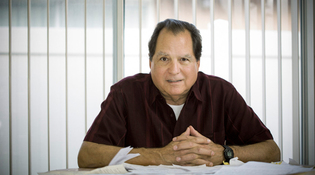 loading
loading
Where They Are NowExcommunicatedD. Michael Quinn ’76PhD ran afoul of the Mormon church over his writings about its history.  Hugh HamiltonHistorian D. Michael Quinn '76PhD, a scholar of and former member of the Mormon church, last held an academic appointment in 2002–03, when he was a visiting fellow at Yale. View full imageD. Michael Quinn ’76PhD, who turns 70 this March, has not held a tenured job since leaving Brigham Young University in 1988. The author of important texts such as Early Mormonism and the Magic World View, he was excommunicated from his church in 1993. In 2006, the Wall Street Journal reported on claims by other academics that pressure from Mormon donors has kept Quinn a “pariah” in higher education. Quinn lives in Rancho Cucamonga, California. Y: How were you raised? Q: My mother was a sixth-generation Mormon, a blue-eyed redhead, and my father was born in Arizona of Mexican parents. He was Roman Catholic. But my parents divorced when I was four, so I was raised exclusively as a Mormon. I was very devout. Y: When did things go wrong for you and the church? Q: I started researching problem areas in Mormon history when I was 17. It was really about five years before I realized that I could be on a collision course with some Mormons. I kept thinking that God had a plan for me, and that it would all work out. Y: What was it like being Mormon at Yale, after having studied at Brigham Young and the University of Utah? Q: At BYU, everything was Mormon. The outside world was the counterculture. After three years in the military, I decided to switch my major to history. So I started at the University of Utah, and there everything in my experience was counter-Mormon. But religion was still defining. My experience at Yale was this tremendous feeling that religion was important if it was important to you, but it wasn’t important to Yale. That was a tremendous liberating experience to me. Y: You were one of the “September Six,” yes? Q: In 1993, six scholars and feminists were targeted publicly with trials that ended up with all but one of us excommunicated. Y: Why were you excommunicated? Q: It was a long process. It started with my local Latter-day Saints leader showing up on my doorstep with a letter accusing me of apostasy. But the conflicts had begun earlier, when I wrote that plural marriage—polygamy—was still authorized by the LDS First Presidency for 14 years after it was officially abandoned. The next thing was my publication about the connections between early Mormonism and folk magic and the occult. The apostasy accusation listed three publications I had written or was quoted in. When it finally came to the decision, months later, I was excommunicated for not cooperating, for not giving evidence against myself. It started as apostasy and ended as bad manners. Y: Can Mormon scholars do good work? Q: I think that is now possible without the kind of repercussions I experienced. The attitude at church headquarters has become far more open, far less paranoid about people who do Mormon history. Y: Do you still believe in the tenets of Mormonism? Q: I am quite orthodox in the nineteenth-century Mormon sense about Mormon faith planks. But in terms of twenty-first-century Mormonism, I am very radical. I don’t believe Mormonism has all truth, that it’s the one and only true church. I accept truth from whatever sources it comes, whether Darwin or Marx or whatever direction I find truth. That includes religion, whether it’s Muhammad or Buddha.
The comment period has expired.
|
|